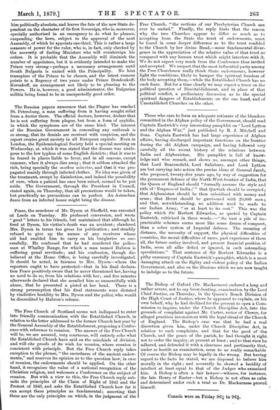The Bishop of Oxford (Dr. Mackarness) endured a long and
rather severe, not to say brow-beating, examination by the Lord Chief Justice, on Thursday, in the Queen's Bench Division of the High Court of Justice, where he appeared to explain, on his own behalf, why he had declined for the present to open a Com- mission to inquire, under the Church Discipline Act, into the grounds of complaint against Mr. Carter, rector of Clewer, for alleged practices inconsistent with the legal ritual of the Church of England. The Bishop's case was that he had a real discretion given him, under the Church Discipline Act, in relation to such complaints, and that for the good of the Church, and the peace of the parish, he had thought it right not to order the inquiry, at present at least ; and to that view he adhered, and defended it with a clearness and pertinacity that, under so hostile an examination, seem to us really remarkable Of course the Bishop may be legally in the wrong. But having regard to the facts he stated, we are disposed to believe him morally in the right ; and assuredly he showed a lucidity of intellect at least equal to that of the Judges who examined him. A Bishop is often a fair lawyer—witness, for instance, the late Henry of Exeter—but a Bishop is not often as calm and determined under such a trial as Dr. lifackaruess proved. himself.


































 Previous page
Previous page